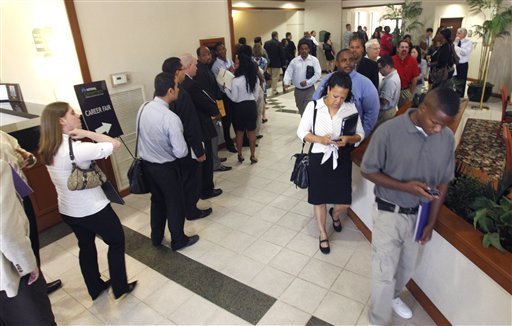Yes, Hotels Draw Job Seekers. So What?

Journalists need good, shocking examples of the country's still serious unemployment problems and one offered itself this past weekend when people filled out more than 16,000 applications for about 750 positions as a new Cleveland casino. The deluge of applications made for good TV and appeared on dozens of websites.
Only one problem: dramatic as they are, the long lines of job seekers for a hotel are meaningless for a hotel or big casino are meaningless. (The Cleveland operation has no hotel as such but does offer hundreds of hotel-like jobs.)
Although Cleveland has surely seen better days, the strength of its medical and education sectors in particular have carried it through the recession pretty well. The 7.1 percent metro-area unemployment rate, the Bureau of Labor Statistics finds, is actually a point and a half below the national average. So, yes, there are a lot of people out of work in Cleveland but it's actually one of the few rust-belt metro areas that's doing well relative to the country.
In fact, no matter what the economy, new hotel openings will always produce massive numbers of applications. Large hotels are one of the few business enterprises that have jobs appropriate for almost everyone: there are lots of not-so-skilled (but, in many cases, decently paid and unionized) jobs cleaning rooms and serving food. Skilled craftspeople like carpenters also have a place in hotels. And not all hotel jobs are blue collar either: white collar conference planning/junior management jobs pay decently, will often train on the job (conference planning isn't rocket science) and offer quicker advancement than most other entry level positions with big companies. Finally, casino dealer jobs pay really well despite not requiring any serious formal education: a personable dealer working a table game can easily take home $80,000 a year.
Unlike other similar "job for everyone" institutions like universities and hospitals, new hotels open rather frequently and need to staff up all at once. Large hotels, furthermore, are almost always purpose-built structures in prominent, central locations that lots of people pass by; their mere construction is a huge advertisement for job seekers. Even in the buoyant late 1990s economy, new hotels attracted far more applicants than they had jobs for. (Dozens more stories like that one.)
The bottom line is pretty simple: in any economy, a brand new hotel opening will be deluged with job seekers since it's one of the few places anyone can work. Even in a full-employment situation, a fair number of people who are simply dissatisfied with their jobs and decide to apply for hotel jobs. Is 16,000 applications for 750 jobs a lot? Yes. Would there be fewer in a better economy? Yes. But around-the-block lines for jobs at a new hotel will materialize in any economic situation. Dramatic as they are, they really aren't news.

